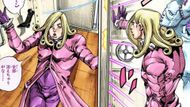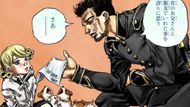Steel Ball Run has been one of my favorite parts of JoJo’s Bizarre Adventure for nearly a decade now. I’ve seen every take imaginable, but there’s one particular interpretation that never sits right with me: that Funny Valentine was never wrong and that he was the true hero of the story.
He is the main antagonist of Steel Ball Run, yet he’s so charismatic that he’s managed to convince a portion of the fanbase that his morally corrupt actions were somehow noble or justified. Some even argue that hoarding divine power to benefit a single country—the United States—is acceptable. This belief persists despite the fact that it brings suffering and chaos to the rest of the world.
That is why it is important to deconstruct Funny Valentine’s character. While Dio, Kars, Kira, Diavolo, and even Enrico Pucci were terrifying in their own right, Funny Valentine is Araki’s ultimate villain. He was the most refined, ideologically dangerous, and symbolically loaded. This is the villain who pretends righteousness, wraps it in a national flag, and sells it as virtue.

In Steel Ball Run, Funny Valentine was born during one of the most politically unstable eras in American history. From the aftermath of the Mexican-American War to the onset of the Civil War, Valentine’s life is shaped by the chaos of a nation redefining itself. His father died in battle, and the story of that sacrifice was passed down to him by Captain Valentine, along with a symbolic handkerchief bearing his birth date.
At this stage, his patriotism was pure. I could even argue that it was noble. But like many ideals held in childhood, it was soon corrupted by reality. Valentine fought for the Union in the Civil War and was captured and tortured, gaining a scar that resembled the American flag. That trauma did not weaken his devotion, but rather it radicalized it.
Years later, during a military expedition, Valentine discovered the Heart of the Holy Corpse and, with it, awakened his Stand: Dirty Deeds Done Dirt Cheap (D4C). It’s this power that allows Valentine to rise, survive, and eventually hatch his grand plan: gather all the corpse parts to bring divine fortune to the United States, no matter the cost.
The religious core

And this is where the religious themes of Steel Ball Run cannot be ignored. Unlike other JoJo parts, the divine is explicitly real in Part 7. Jesus Christ, the literal Christian figure, appears in spirit and vision to guide Johnny Joestar, telling him that the Holy Corpse must never fall into the wrong hands. That spiritual approval gives Johnny’s quest moral authority that Valentine never receives.
So when Jesus tells Johnny not to shoot if his heart wavers, and Johnny still chooses to oppose Valentine, he’s doing so with the support of divine judgment. Meanwhile, Valentine lies about his father’s legacy, distorts the truth, and uses the body of Christ for self-serving nationalist goals.
To put it bluntly: Funny Valentine in Steel Ball Run is a false prophet, a corrupted messiah, and in many ways, an antichrist figure—like Enrico Pucci before him. He exploits spiritual power not to uplift the world, but to consolidate it.
"Taking the first napkin": A false justification by Funny Valentine in Steel Ball Run

The infamous napkin speech in Steel Ball Run encapsulates Valentine’s ideology. He explains that in a civilized setting, the first person to take a napkin from the table determines the order for everyone else. His point? America must be the one to take the first napkin, or someone else will.
On the surface, it’s a metaphor for leadership. But underneath, it reveals a fear-based worldview—one that assumes only domination ensures survival. And that’s where his idea of patriotism falls apart. True patriotism is not about placing your country above all others at all costs. It’s about uplifting your country without crushing others.
In Steel Ball Run, Valentine’s patriotism is rooted in insecurity and paranoia. He believes peace can only be achieved through an imbalance in a universe where America gets fortune, and the rest get famine. That’s not peace. That’s colonialism.
Final thoughts
The tragedy of Funny Valentine in Steel Ball Run is that he wasn’t always evil. His ideals began with a sincere desire to honor his father and help his country. But along the way, those ideals were warped by trauma, fear, and unchecked ambition.
And in that way, Valentine becomes a cautionary tale of how good intentions, when left unchallenged, can become monstrous. He stops questioning himself. He silences dissent. He rationalizes cruelty. And that, more than anything, makes him the most dangerous villain in JoJo.
